As we can see from past episodes, the show has not shied away from the nasty. Ruth Davenport’s murder was nasty, the venom in the Hastings’ marriage was nasty, the strange ethereal creature in the box was nasty. Need I say more?
Yes, I do because it’s a nasty you can’t look away from. Wherever you turn, the uncanny and the dark just beckon for you to approach, to taste the silence as well as the unstable loudness. But a world this outlined by chaos requires a counterpoint, a notion or agent of order. Let’s just say it the way it is, we need a hero in an amoral world. We need someone to hold our hand to ease us through our fears. We need Agent Dale Cooper, the man who has given us words to live by.
Thus, it’s a good thing that he has finally come out of the Black Lodge, after 25 years. But that is a long, long time for a human being. The world Dale Cooper has set foot in is no longer the same as the one he left on that frightful night on the summer of 1991. To one who’s roamed the other side for so long, the world he once knew is certainly far from mundane.
The landing
Cooper’s escape from the Black Lodge was as strange as his long stay in it. After ‘falling’ through the cosmos, it would feel somewhat silly for him to just land somewhere on Earth, like the grass, the sea or a bin, as you do. Instead, he lands on a place I can best describe as a building stranded in the middle of the sea. The dark mauve-lilac filter of the camera imbues this location with an atmosphere much too different from the Black Lodge, but just as otherworldly. Upon entering the building, he comes upon a strange ‘blinded’ woman in the process of what appears to be meditation. The interactions that follow are functionally strange, as both audio and editing are synchronized to alter the delivery of the actors’ performance.
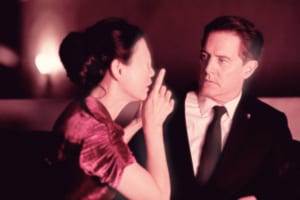
Simply put, it’s like watching movement unfold as if it were a broken record. The audio aids the conveyance; Cooper’s voice sounds distant and muffled, and the woman communicates through strange sounds. Sequentiality itself is fractured through editing and quick cuts to other sights in the room. The only constants are Cooper’s confusion, the woman’s protective/fearful demeanor, the humming of a strange device with the number 15 on the wall, and a loud knocking on a door nearby. This is as art-house as it gets, which may not land as smoothly for some viewers.
Then again, this show (especially this revival) is not exactly mainstream. However, the wordless narrative of the scene is conveyed efficiently. Cooper’s arrival has triggered a menace in this otherwise, sort-of serene ambiance.
All adherence to geographical reality is out the window at seeing that this place exists inside of a small satellite-like box in outer space. Something similar to the TARDIS’ ‘bigger on the inside’ gig, but more alien than the TARDIS. In the end, the woman appears to sacrifice herself protecting Coop from an unseen door-knocking entity. Looking down, Dale sees a most peculiar sight: Major Briggs’ face floating in space, speaking the words ‘Blue Rose’. To leave the viewer a little more uncertain about the nature of this place, Cooper returns to the room. The camerawork itself is a bit more sober, and there is a second woman around. Another device on the wall, with the number 3, begins humming. So, we cut to Cooper’s doppelganger.
Inner works
This place definitely shares a link with the corporeality of Coop’s doppelganger. His very presence here appears to provoke physical discomfort in evil Coop as he drives. I mean, I know carsickness, and it’s awful, but this looks quite different. Dale realizes that he cannot approach this device on the wall without giving himself a nasty jolt. These electrical disturbances, in turn, cause further discomfort in evil Coop. That’s when the woman relays a message to him in that peculiar voice reverberation. “When you get there, you will already be there.” Cue the dreadful sound of someone violently knocking on the door. The woman urges Dale to be on his way, before her mother comes.
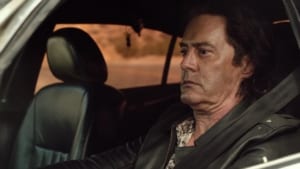
So, in spite of the jolts, Cooper ‘dives in’ through the device on the wall, leaving only his dapper shoes behind. It’s a shame because those were very nice shoes, and the sensation of damp shoes is the fucking worst. Even after our hero has left, the knocking continues, so it’s possible that this place and that faceless entity will bear relevance in the future.
Nonetheless, Cooper’s escape, or his interference with that mysterious device, leaves the doppelganger severely disoriented, while he’s at the wheel, of all places. This impairment leaves his dark counterpart ripe for a car crash. The doppelganger survives only to meet a possibly worse fate. Noticeably sick, he begins to see the phantasm of red curtains unfolding behind the windshield.
This appears not to be the only consequence of Coop’s doing, as it turns out that he had a second doppelganger. His name is Dougie Jones. He wears that ring we know from the prequel film, and he’d just had a session with Jade, a sex worker (Nafessa Williams). The numbing of his arm is only the first symptom of a more severe discomfort. He vomits on the carpet before being teleported away, back to the Black Lodge. Dougie sitting amidst the red curtains is the last thing Mr. C sees before vomiting as well as passing out. The amount of detail around the vomit is not nice to see, but it bears mentioning that it seems to resemble garmonbozia. As you’d expect, bad Coop has ‘accrued’ a lot of it. Dougie vomited a fair bit, so it’s likely that he’s been not entirely a good boy.
The Switcheroo
In the Black Lodge, MIKE tells Dougie that somebody manufactured him for a purpose, which has been fulfilled. This means Dougie is now redundant, but he doesn’t appear to think much of his ensuing demise. But no matter is really created or destroyed, but transformed. Through special effects half-amusing and half-freaky, Dougie becomes a small golden bead. That and his ring are all that remain of him. We hardly knew ye, Dougie.
Anyway, back in the mundane world, the original Cooper comes into the room through the electrical outlet. Jade walks in on him, and she’s rather startled by ‘Dougie’s’ change in attire and haircut. She doesn’t dwell on it, though, as it’s time for her and Dougie to be on their way.
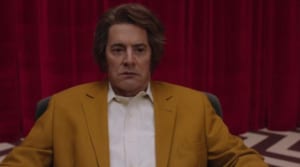
What follows is a treat to long-time fans who missed the taste of humor from the first two seasons. The experience of returning to the real world can’t possibly be easy, especially after such a long time. Therefore, Cooper’s smarts and core capabilities are too rusty at this point. This translates into an almost amusing lack of competence; both metaphysical tragedy and awkward comedy are at work, at the same time. The result is that Jade has to drive him around since ‘Dougie’ can’t find his keys, or do much else.
Still, the disparity in coherence continues as mysterious drivers monitor his movements. All the while Coop can do nothing but repeat what other people say. In fact, Cooper’s current clumsiness saves his life, as the drivers look ready to shoot him on sight.
It’s basically a comedy of errors, with a deadly twist, all because of Dougie was naughty. Since the drivers missed their target when they expected him to ride away, they’ll take precautions. And for these occasions, the safest bet is simply to rig your mark’s car. In the middle of it all, Jade’s patience with Cooper implies that he was nowhere as vile as Mr. C. And speak of the devil, the police come upon evil Cooper’s car. He looks to be unconscious from his near-forceful return to the Black Lodge. The cops call for an ambulance and gas masks, as the smell of garmonbozia is beyond foul for the human senses. Creamed corn may not be to everybody’s taste, but evil certainly stinks.
Chocolate bunnies and golden shovels
Back in the Twin Peaks’ Sheriff Department, Hawk has enlisted the aid of Andy and and Lucy to find clues on Cooper. So far they’ve found nothing. Before frustration can take its toll, Lucy reminds Hawk of the precise words from Margaret, or rather, her Log. The way to find what’s missing has to do with Hawk’s Native-American heritage. The dialogues that follow centre around lovable simpletons Andy and Lucy attempting to link chocolate bunnies with Hawk’s heritage in relation to the task at hand. (These chocolate bunnies are evidence found in Laura’s room all the way back in season one, by the way). Although well-meaning, this approach yields little result. Interestingly, Hawk seems to consider possible validity to this effort; the pacing of dialogue may manage to momentarily convince the audience as well.
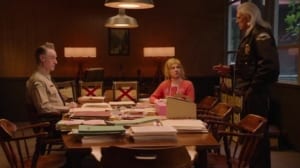
Meanwhile, out in the woods, Dr. Jacoby uses a clever contraption to make use of those shovels we saw back in the first episode. Actually, that’s not quite right. He uses the contraption to spray paint the shovels gold. Why? Because he’s goddamn Dr. Lawrence Jacoby. We don’t know yet if he’s still a practitioner, but it matters not, because he’s a doctor of the soul. He sees the world in 3-D. The intention of the previous sentence is only half-mocking. While this moment may appear as a mere non sequitur, we cannot dismiss the importance of the character by his quirks. Let’s not forget his vital contribution in unveiling the pain behind Laura Palmer’s blissful facade.
Whether this enterprise of his could harbor some esoteric, pragmatic relevance or even become a Chekhov’s Gun, matters little. At this point, I’d like to to compare David Lynch’s film making with Early Cubism. The core tenet of Cubism is to observe and express a shape through every possible angle and perspective. The art exists not in its success (which is impossible through our understanding and experience of dimensions), but in its expression.
In the same manner, I’d argue that everything in Lynch’s cinematography can be observed in a similar manner. Not as vital relevance, but as perspective and angle of the whole. Quirk and silliness are all part of the whole. For this reason, on my eyes, these characters are as worthy and delightful as gold and chocolate… GOLDEN CHOCOLATE
Our golden boy
Back to Cooper now. Jade drops him off at a casino, where Dougie probably had work or business. Although non-committed, she’s still fairly concerned about ‘Dougie’, so she has the decency to give him some money for him to call for help, before driving away. With ‘baby steps’ we see Cooper manage to navigate his way around, well, life. You could argue that a place such as a casino is the least appropriate place to find your way around motor competence anew.
Appropriately, much against Jade’s intention, Cooper ends up getting money to gamble. On his own, this stopped being in the slightest bit amusing. Now, it’s just extremely sad and concerning, especially considering his previous status as something of an ace.
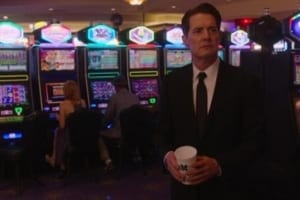
Nonetheless, amidst the loud atmosphere of the casino, one note strikes odd in Cooper’s ear. In the distance, he sees a slot machine indicated by an ethereal image of the Black Lodge. Naturally, since this represents the only sense of familiarity he has left by now, he sits and plays at this machine. As a result, he hits the ultimate jackpot. Coop repeats the process at the next Black Lodge ‘sponsored’ machine, with the same outcome. Of course, this is quite the occurrence, especially when it happens threefold, which attracts a lot of attention his way. Not all of it may be welcome, but right now, he doesn’t know it. Our hero is truly and bitterly vulnerable.
Meanwhile, at the FBI Headquarters in Philadelphia, we get to Albert Rosenfield, portrayed by the late and dearly missed Miguel Ferrer, and our other golden boy. Yes, that’s correct, the man himself, David Lynch reprising the role of Deputy Director GORDON COLE (caps intended for effect). They are in the middle of a meeting with other FBI personnel because of a murder case in which one FBI agent has been singled-out as prime suspect.
At the end of the meeting, COLE instructs Special Agent Tamara Preston (Chrysta Bell) to remain so she can show them her findings in New York. It needs be said now, however, that Agent Preston is the protagonist of The Secret History of Twin Peaks by Mark Frost. Hopefully we have potential dark horse-fan favorite in our hands.
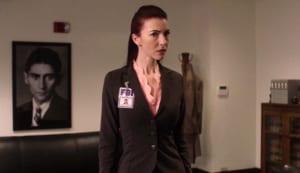
Now about her findings, they start with the brutally savaged corpses of watchman Sam and his girlfriend from the first episode. The image is not easy on the stomach. Among the images, they see the entity in the glass box that killed the two. The murder was messy, but clean in terms of trace—no fingerprints, or identifiable remains of the killer. Suddenly, Director COLE receives a message from the intercom: there is a call regarding Agent Dale Cooper. Tamara, Albert, and COLE all head to his office to receive the call. The three will be flying at dawn… to South Dakota.
This episode comes to a close with a lively tune, “Mississippi” by The Cactus Blossoms. This is fitting in two ways. In spite of the spirit of unpredictability and confusion that permeates our screens and minds with this show, the tone was considerably lighter. There’s more room for a quicker tempo, if you will.
However, there is enough sadness and longing in the lyrics to reprise the viewer’s feelings concerning Dale Cooper. So much has happened since we last saw our hero at his best. But now, we can’t help but yearn for those days when he was strong, competent and charming. There is still so much life in the present, however. Much like John Keats’ “Ode to Melancholy”, this sorrow is still a part of the beauty.
And judging by the plausibility of what the FBI may find in South Dakota, we’ll have plenty of sorrow. Stay tuned lovelies.
All images are courtesy of Showtime
Twin Peaks Season 3 Episode 3 Credits
Directed by David Lynch
Written by Mark Frost & David Lynch

